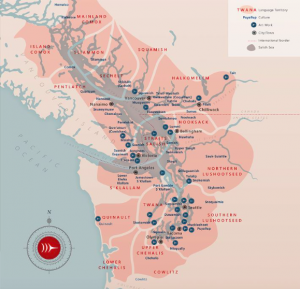Dear Readers,
Welcome to our website!
If you are reading this in the United States or Canada, whose lands are you on, dear reader? What are the specific names of the Native nations(s) who have historical claim to the territory on which you currently read this article? What are their histories before European invasion? What are their historical and present acts of resistance to colonial occupation? If you are like most people in the United States and Canada, you cannot answer these questions. And this disturbs me
-Qwo-Li Driskill in “Doubleweaving Two-Spirit Critiques” (pg. 71).
Before proceeding further, we would like to acknowledge that the following blog posts are situated and in some way, articulated on the unceded Coast Salish territories of specifically xʷməθkʷəy̓əm (Musqueam), mi ce:p kwətxwiləm (Tsleil-Wauthuthand,) and Skwxwú7mesh Úxwumixw (Squamish) First Nations.

As students working within a colonial institution, the University of British Columbia, we reap the benefits of occupation and citizenship within the settler nation of so-called Canada daily, on and off of campus. We recognize that in discussing queer politics, it is of vital importance to recognize the colonial impositions of gender and sexuality forced onto Indigenous nations, which are foundational to the national project of Canada as a country. Heteropatriarchy and heteronormativity are key elements of the production of citizen-subjects. Neoliberal homonormativity changes the terrain by offering citizenship to certain queer subjects, as the content of this blog will illustrate. Queer settler subjects can and do enact colonial violence through their investment in the nation, with or without intention.
With this in mind, we explore on this website how queerness intersects with race, gender, socioeconomic class, diaspora and migration, religion, nationalism, and of course, decolonization. Discussions around queer politics must be grounded in the recognition that our knowledge is inherently mediated by colonial methods of knowledge production in the form of universities, and other institutions.
Going forward, we wish to consider questions such as: Is it even possible to study queer theory while not studying colonialism too? How might we make sense of the fact that the “LGBT” acronym so commonly-used in Canada was not used by Indigenous peoples? Is it even possible for there to be a transnational “LGBT” movement if the acronym is conceptualized from the experiences of colonial countries, such as the United States and Canada? How might a two-spirit or Māhū person resonate with the “LGBT” acronym? These inquiries bridge together the importance of decolonial practices that intersect and co-construct queer and trans of colour theorizing.
In Doubleweaving Two-Spirit Critiques: Building Alliances between Native and Queer Studies Qwo-Li Driskill writes, “Native studies positions itself as activist scholarship that centralizes the relationship between theory and practice.” (Driskill, 2010) This struck us as a particularly valuable sentiment, and one to bear in mind as you engage with the collection of insights on this website. While these scholarly considerations are valuable, they become so only when paired with and incorporated into our everyday political practices and endeavors. It can be illuminating and affirming to research and think through these concerns, but merely considering and disseminating them is not enough. We must act in accordance with these beliefs as well. With that in mind, we hope you enjoy these entries.
Works Cited:
Driskill, Q. (2010). Doubleweaving Two-Spirit critiques: building alliances between Native and queer studies. GLQ: A Journal of Lesbian and Gay Studies, 16(1), 69-92. doi:10.1215/10642684-2009-013
Indigenous Lands. Adapted from Salishan Languages Map in Barbara Brotherton (ed), S’abadeb: The Gifts, Pacific Coast Salish Art and Artists. Seattle: Seattle Art Museum and University of Washington Press; 2008: xix. Retrieved from: http://www.burkemuseum.org/blog/curated/coast-salish-art
Justice, D. H. (2010). Notes towards a theory of anomaly. GLQ: A Journal of Lesbian and Gay Studies, 16(1-2): 207-242.